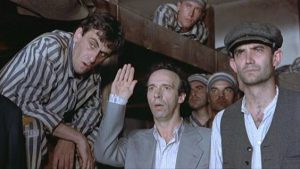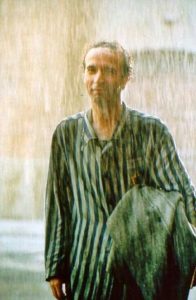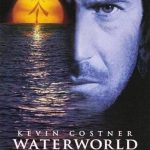Life is Beautiful (1997)

Life is Beautiful (1997)
Life is Beautiful is a heartwarming and heartbreaking masterpiece that masterfully blends comedy, romance, and tragedy to tell a story of hope, love, and resilience in the darkest of times. Directed by and starring Roberto Benigni, this 1997 Italian film offers a poignant, unforgettable exploration of the human spirit’s ability to find beauty and laughter, even in the face of unimaginable horrors.

The film is set in 1930s Italy, where Guido Orefice (Roberto Benigni), a charming and optimistic Jewish man, falls in love with Dora (Nicoletta Braschi), a beautiful schoolteacher. Their love story is one of fairy-tale romance, filled with joy, humor, and Guido’s relentless, whimsical spirit. Soon, they marry and have a son, Giosuè (Giorgio Cantarini), and their life seems idyllic—until the shadow of World War II and the rise of fascism darkens their world.
In the film’s second half, Guido and his family are torn from their lives and sent to a Nazi concentration camp. Here, the film shifts from lighthearted comedy to a deeply emotional portrayal of survival under unimaginable conditions. Yet, even in the concentration camp, Guido’s unshakable optimism remains. Determined to shield his son from the horrors surrounding them, Guido concocts an elaborate lie: he convinces Giosuè that their time in the camp is part of an elaborate game, and the grand prize is a real tank.
Through humor, creativity, and unwavering love, Guido turns their harrowing ordeal into a series of challenges that make Giosuè believe they are playing an exciting game. The strength of Life is Beautiful lies in the way it shows how love and imagination can protect the innocence of a child and bring light to the darkest of places.
Roberto Benigni’s performance as Guido is nothing short of extraordinary. He brings a contagious energy and warmth to the character, portraying Guido as a man whose love for his family knows no bounds. His ability to inject humor into even the most tragic circumstances creates moments of bittersweet joy, reminding audiences of the power of positivity in the face of despair. His chemistry with both Nicoletta Braschi and Giorgio Cantarini is heartfelt and genuine, making the family’s bond all the more powerful.
The film’s balance of humor and tragedy is handled with incredible delicacy. Benigni’s direction carefully navigates the emotional landscape, never trivializing the horrors of the Holocaust but instead focusing on the triumph of the human spirit. The juxtaposition of Guido’s comedic antics with the backdrop of the concentration camp highlights the film’s central message: that love and hope can endure, even in the darkest moments of history.

The emotional climax of Life is Beautiful is both devastating and uplifting. Guido’s ultimate sacrifice and Giosuè’s survival serve as a reminder of the depth of a parent’s love and the lengths they will go to protect their child. The film’s closing scenes, where Giosuè finally realizes the “game” his father played to protect him, is a deeply moving moment that will stay with viewers long after the credits roll.
Life is Beautiful is a triumph of storytelling, blending laughter and tears in a way that few films can. It is a celebration of life, love, and the human capacity to find beauty and meaning even in the darkest times. With its powerful performances, emotional depth, and unforgettable narrative, Life is Beautiful stands as one of cinema’s greatest achievements—a film that inspires, moves, and reminds us of the strength of the human heart.
SUGGESTED VIDEO FOR YOU: Tomorrowland (2015)











